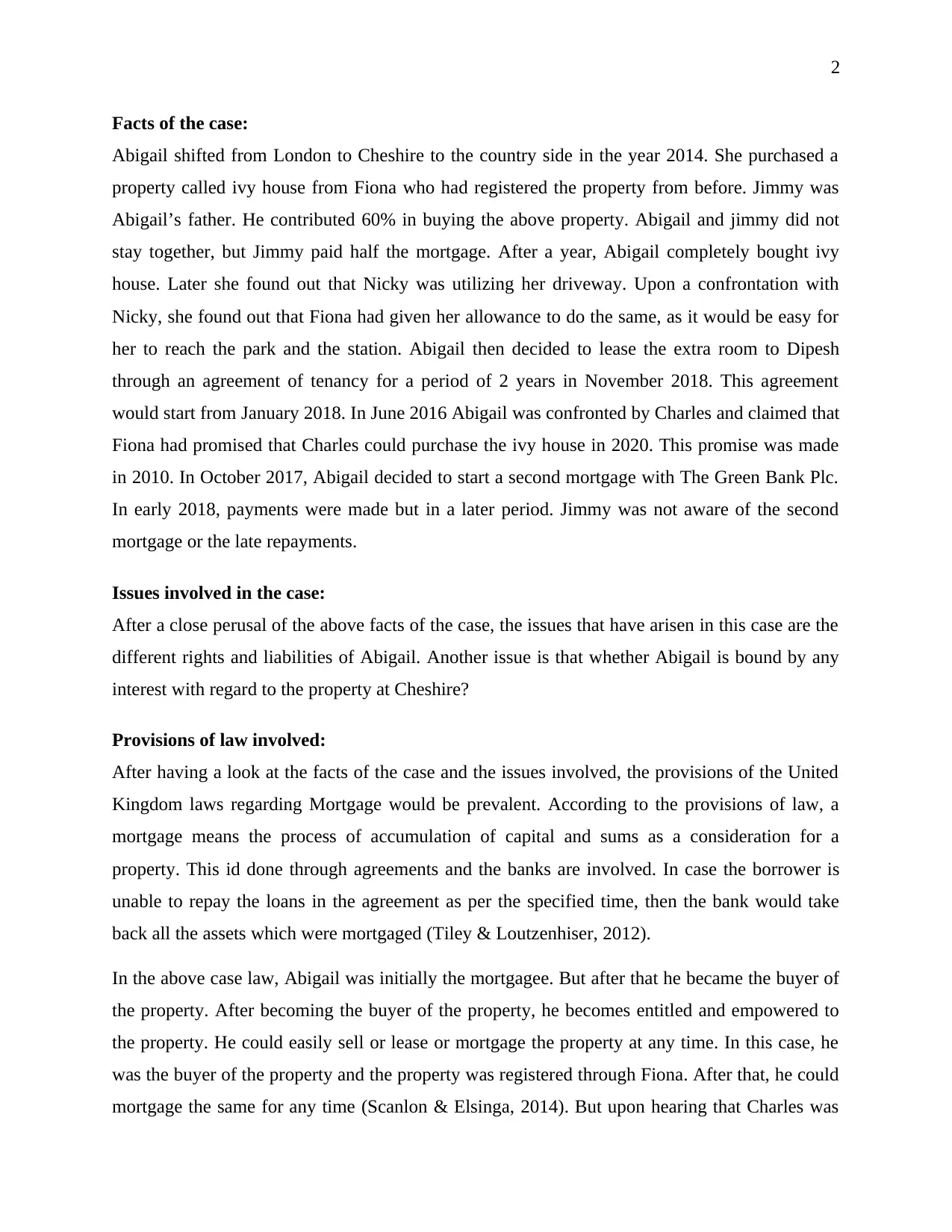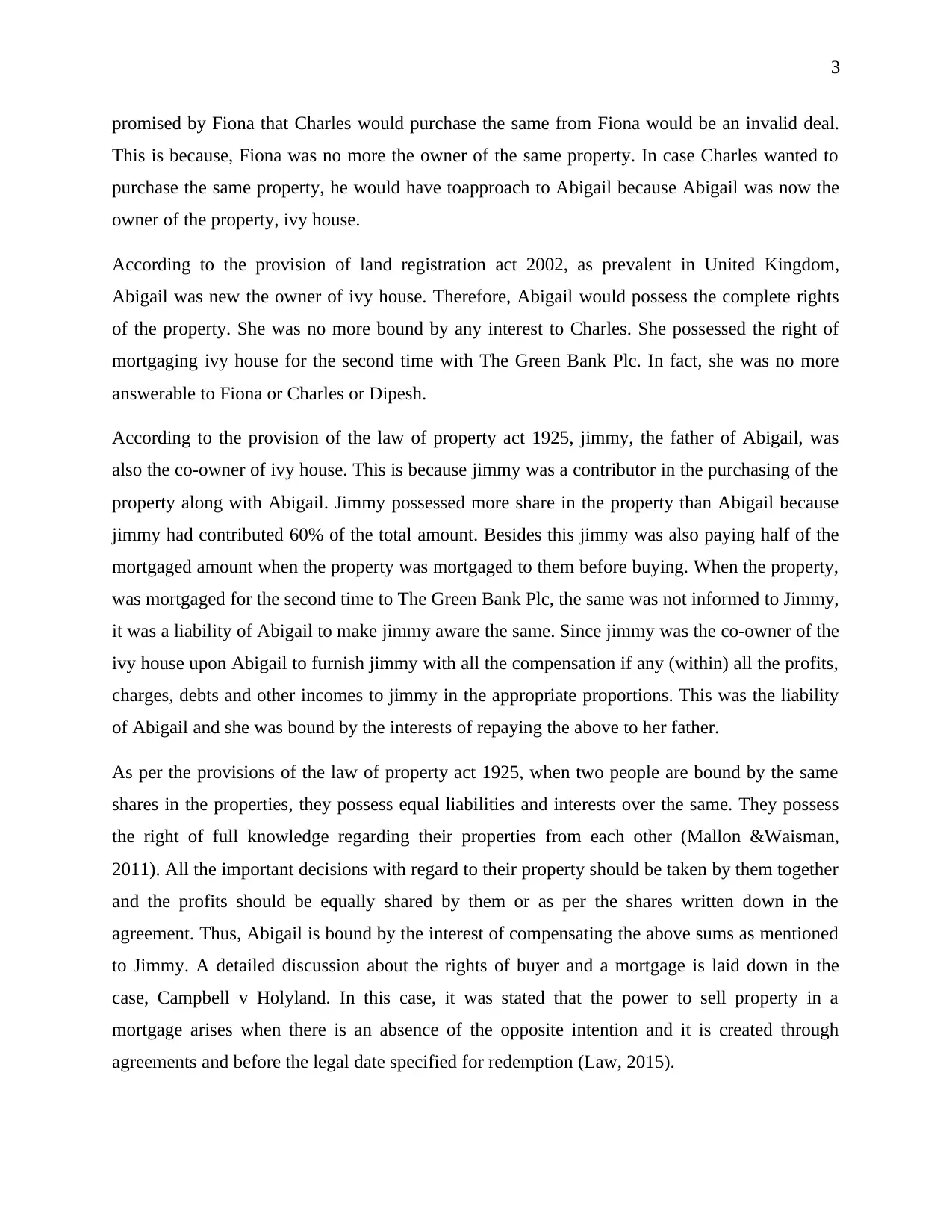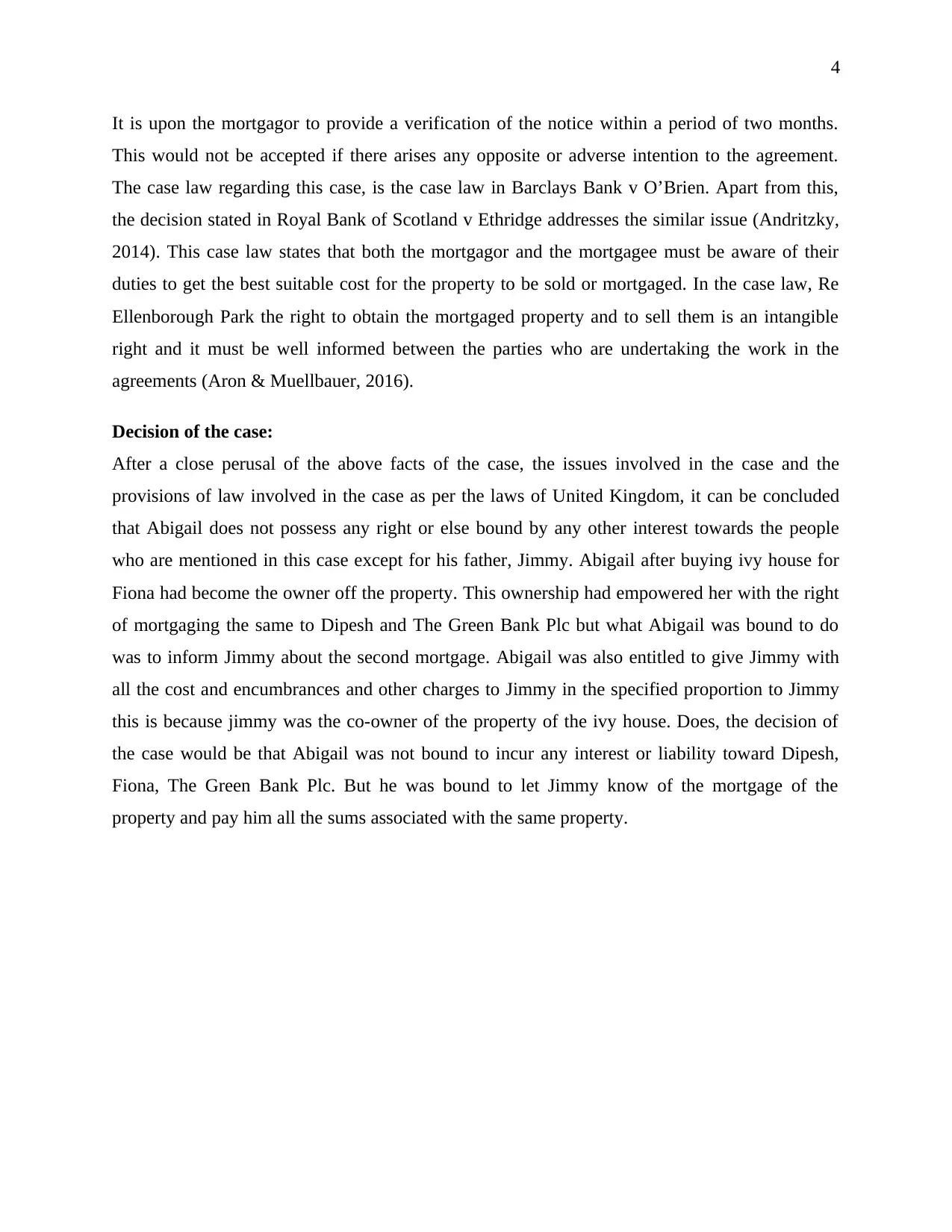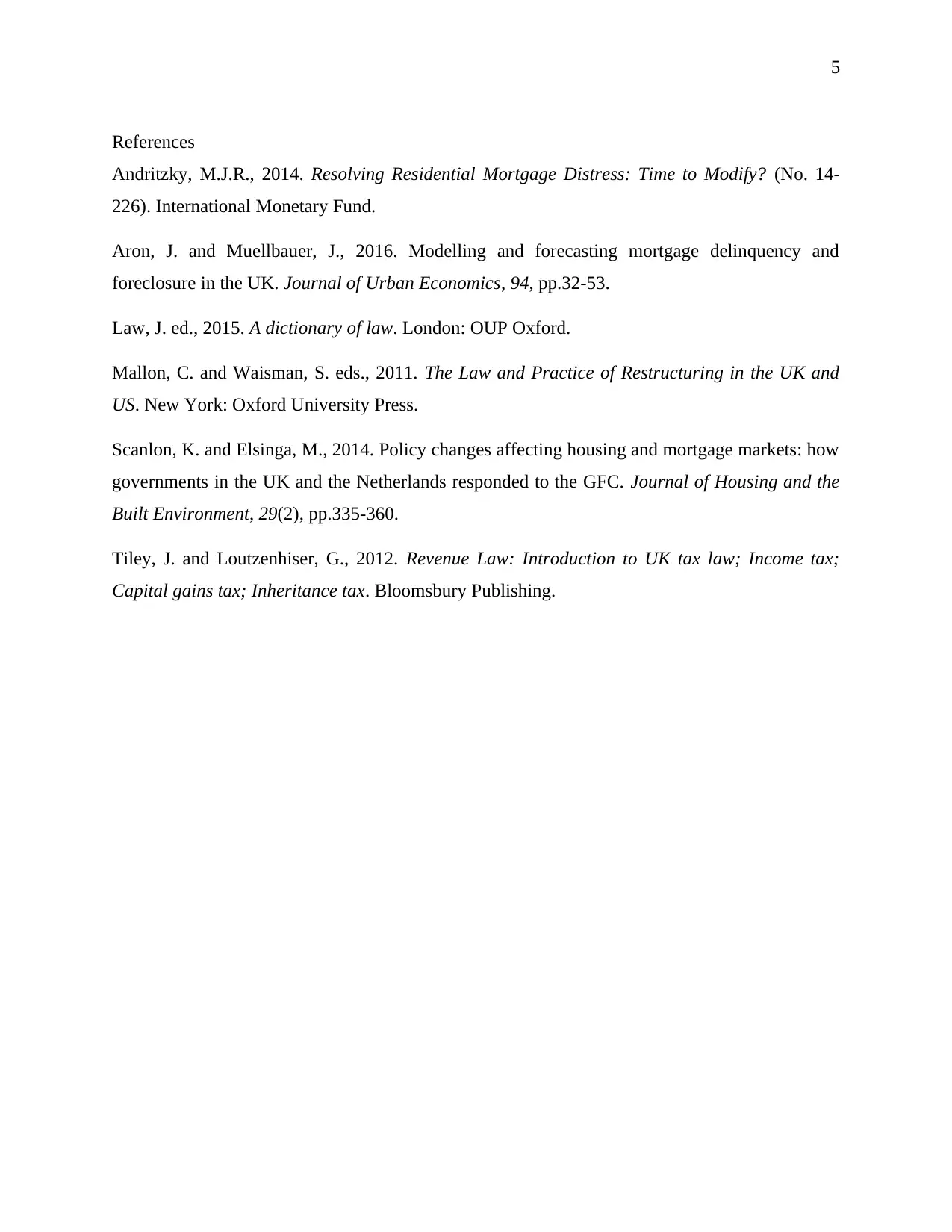Property Law Case Study: Rights, Liabilities, and Mortgage Analysis
VerifiedAdded on 2023/04/21
|5
|1562
|216
Case Study
AI Summary
This case study delves into a complex land law scenario involving Abigail's purchase of Ivy House and the subsequent property rights and mortgage issues that arise. The case examines the rights and liabilities of Abigail, Jimmy, Nicky, Dipesh, Charles, and The Green Bank Plc, focusing on the legal implications of mortgages, co-ownership, and promises related to the property. Key legal provisions from the Land Registration Act 2002 and the Law of Property Act 1925 are applied to determine the validity of claims and obligations. The analysis concludes that Abigail is primarily obligated to Jimmy, her father and co-owner, regarding transparency and compensation related to the second mortgage, while not being bound by interests to others mentioned in the case. This assignment is available on Desklib, where students can find various study tools and solved assignments.

1
Land Law
Land Law
Paraphrase This Document
Need a fresh take? Get an instant paraphrase of this document with our AI Paraphraser

2
Facts of the case:
Abigail shifted from London to Cheshire to the country side in the year 2014. She purchased a
property called ivy house from Fiona who had registered the property from before. Jimmy was
Abigail’s father. He contributed 60% in buying the above property. Abigail and jimmy did not
stay together, but Jimmy paid half the mortgage. After a year, Abigail completely bought ivy
house. Later she found out that Nicky was utilizing her driveway. Upon a confrontation with
Nicky, she found out that Fiona had given her allowance to do the same, as it would be easy for
her to reach the park and the station. Abigail then decided to lease the extra room to Dipesh
through an agreement of tenancy for a period of 2 years in November 2018. This agreement
would start from January 2018. In June 2016 Abigail was confronted by Charles and claimed that
Fiona had promised that Charles could purchase the ivy house in 2020. This promise was made
in 2010. In October 2017, Abigail decided to start a second mortgage with The Green Bank Plc.
In early 2018, payments were made but in a later period. Jimmy was not aware of the second
mortgage or the late repayments.
Issues involved in the case:
After a close perusal of the above facts of the case, the issues that have arisen in this case are the
different rights and liabilities of Abigail. Another issue is that whether Abigail is bound by any
interest with regard to the property at Cheshire?
Provisions of law involved:
After having a look at the facts of the case and the issues involved, the provisions of the United
Kingdom laws regarding Mortgage would be prevalent. According to the provisions of law, a
mortgage means the process of accumulation of capital and sums as a consideration for a
property. This id done through agreements and the banks are involved. In case the borrower is
unable to repay the loans in the agreement as per the specified time, then the bank would take
back all the assets which were mortgaged (Tiley & Loutzenhiser, 2012).
In the above case law, Abigail was initially the mortgagee. But after that he became the buyer of
the property. After becoming the buyer of the property, he becomes entitled and empowered to
the property. He could easily sell or lease or mortgage the property at any time. In this case, he
was the buyer of the property and the property was registered through Fiona. After that, he could
mortgage the same for any time (Scanlon & Elsinga, 2014). But upon hearing that Charles was
Facts of the case:
Abigail shifted from London to Cheshire to the country side in the year 2014. She purchased a
property called ivy house from Fiona who had registered the property from before. Jimmy was
Abigail’s father. He contributed 60% in buying the above property. Abigail and jimmy did not
stay together, but Jimmy paid half the mortgage. After a year, Abigail completely bought ivy
house. Later she found out that Nicky was utilizing her driveway. Upon a confrontation with
Nicky, she found out that Fiona had given her allowance to do the same, as it would be easy for
her to reach the park and the station. Abigail then decided to lease the extra room to Dipesh
through an agreement of tenancy for a period of 2 years in November 2018. This agreement
would start from January 2018. In June 2016 Abigail was confronted by Charles and claimed that
Fiona had promised that Charles could purchase the ivy house in 2020. This promise was made
in 2010. In October 2017, Abigail decided to start a second mortgage with The Green Bank Plc.
In early 2018, payments were made but in a later period. Jimmy was not aware of the second
mortgage or the late repayments.
Issues involved in the case:
After a close perusal of the above facts of the case, the issues that have arisen in this case are the
different rights and liabilities of Abigail. Another issue is that whether Abigail is bound by any
interest with regard to the property at Cheshire?
Provisions of law involved:
After having a look at the facts of the case and the issues involved, the provisions of the United
Kingdom laws regarding Mortgage would be prevalent. According to the provisions of law, a
mortgage means the process of accumulation of capital and sums as a consideration for a
property. This id done through agreements and the banks are involved. In case the borrower is
unable to repay the loans in the agreement as per the specified time, then the bank would take
back all the assets which were mortgaged (Tiley & Loutzenhiser, 2012).
In the above case law, Abigail was initially the mortgagee. But after that he became the buyer of
the property. After becoming the buyer of the property, he becomes entitled and empowered to
the property. He could easily sell or lease or mortgage the property at any time. In this case, he
was the buyer of the property and the property was registered through Fiona. After that, he could
mortgage the same for any time (Scanlon & Elsinga, 2014). But upon hearing that Charles was

3
promised by Fiona that Charles would purchase the same from Fiona would be an invalid deal.
This is because, Fiona was no more the owner of the same property. In case Charles wanted to
purchase the same property, he would have toapproach to Abigail because Abigail was now the
owner of the property, ivy house.
According to the provision of land registration act 2002, as prevalent in United Kingdom,
Abigail was new the owner of ivy house. Therefore, Abigail would possess the complete rights
of the property. She was no more bound by any interest to Charles. She possessed the right of
mortgaging ivy house for the second time with The Green Bank Plc. In fact, she was no more
answerable to Fiona or Charles or Dipesh.
According to the provision of the law of property act 1925, jimmy, the father of Abigail, was
also the co-owner of ivy house. This is because jimmy was a contributor in the purchasing of the
property along with Abigail. Jimmy possessed more share in the property than Abigail because
jimmy had contributed 60% of the total amount. Besides this jimmy was also paying half of the
mortgaged amount when the property was mortgaged to them before buying. When the property,
was mortgaged for the second time to The Green Bank Plc, the same was not informed to Jimmy,
it was a liability of Abigail to make jimmy aware the same. Since jimmy was the co-owner of the
ivy house upon Abigail to furnish jimmy with all the compensation if any (within) all the profits,
charges, debts and other incomes to jimmy in the appropriate proportions. This was the liability
of Abigail and she was bound by the interests of repaying the above to her father.
As per the provisions of the law of property act 1925, when two people are bound by the same
shares in the properties, they possess equal liabilities and interests over the same. They possess
the right of full knowledge regarding their properties from each other (Mallon &Waisman,
2011). All the important decisions with regard to their property should be taken by them together
and the profits should be equally shared by them or as per the shares written down in the
agreement. Thus, Abigail is bound by the interest of compensating the above sums as mentioned
to Jimmy. A detailed discussion about the rights of buyer and a mortgage is laid down in the
case, Campbell v Holyland. In this case, it was stated that the power to sell property in a
mortgage arises when there is an absence of the opposite intention and it is created through
agreements and before the legal date specified for redemption (Law, 2015).
promised by Fiona that Charles would purchase the same from Fiona would be an invalid deal.
This is because, Fiona was no more the owner of the same property. In case Charles wanted to
purchase the same property, he would have toapproach to Abigail because Abigail was now the
owner of the property, ivy house.
According to the provision of land registration act 2002, as prevalent in United Kingdom,
Abigail was new the owner of ivy house. Therefore, Abigail would possess the complete rights
of the property. She was no more bound by any interest to Charles. She possessed the right of
mortgaging ivy house for the second time with The Green Bank Plc. In fact, she was no more
answerable to Fiona or Charles or Dipesh.
According to the provision of the law of property act 1925, jimmy, the father of Abigail, was
also the co-owner of ivy house. This is because jimmy was a contributor in the purchasing of the
property along with Abigail. Jimmy possessed more share in the property than Abigail because
jimmy had contributed 60% of the total amount. Besides this jimmy was also paying half of the
mortgaged amount when the property was mortgaged to them before buying. When the property,
was mortgaged for the second time to The Green Bank Plc, the same was not informed to Jimmy,
it was a liability of Abigail to make jimmy aware the same. Since jimmy was the co-owner of the
ivy house upon Abigail to furnish jimmy with all the compensation if any (within) all the profits,
charges, debts and other incomes to jimmy in the appropriate proportions. This was the liability
of Abigail and she was bound by the interests of repaying the above to her father.
As per the provisions of the law of property act 1925, when two people are bound by the same
shares in the properties, they possess equal liabilities and interests over the same. They possess
the right of full knowledge regarding their properties from each other (Mallon &Waisman,
2011). All the important decisions with regard to their property should be taken by them together
and the profits should be equally shared by them or as per the shares written down in the
agreement. Thus, Abigail is bound by the interest of compensating the above sums as mentioned
to Jimmy. A detailed discussion about the rights of buyer and a mortgage is laid down in the
case, Campbell v Holyland. In this case, it was stated that the power to sell property in a
mortgage arises when there is an absence of the opposite intention and it is created through
agreements and before the legal date specified for redemption (Law, 2015).
⊘ This is a preview!⊘
Do you want full access?
Subscribe today to unlock all pages.

Trusted by 1+ million students worldwide

4
It is upon the mortgagor to provide a verification of the notice within a period of two months.
This would not be accepted if there arises any opposite or adverse intention to the agreement.
The case law regarding this case, is the case law in Barclays Bank v O’Brien. Apart from this,
the decision stated in Royal Bank of Scotland v Ethridge addresses the similar issue (Andritzky,
2014). This case law states that both the mortgagor and the mortgagee must be aware of their
duties to get the best suitable cost for the property to be sold or mortgaged. In the case law, Re
Ellenborough Park the right to obtain the mortgaged property and to sell them is an intangible
right and it must be well informed between the parties who are undertaking the work in the
agreements (Aron & Muellbauer, 2016).
Decision of the case:
After a close perusal of the above facts of the case, the issues involved in the case and the
provisions of law involved in the case as per the laws of United Kingdom, it can be concluded
that Abigail does not possess any right or else bound by any other interest towards the people
who are mentioned in this case except for his father, Jimmy. Abigail after buying ivy house for
Fiona had become the owner off the property. This ownership had empowered her with the right
of mortgaging the same to Dipesh and The Green Bank Plc but what Abigail was bound to do
was to inform Jimmy about the second mortgage. Abigail was also entitled to give Jimmy with
all the cost and encumbrances and other charges to Jimmy in the specified proportion to Jimmy
this is because jimmy was the co-owner of the property of the ivy house. Does, the decision of
the case would be that Abigail was not bound to incur any interest or liability toward Dipesh,
Fiona, The Green Bank Plc. But he was bound to let Jimmy know of the mortgage of the
property and pay him all the sums associated with the same property.
It is upon the mortgagor to provide a verification of the notice within a period of two months.
This would not be accepted if there arises any opposite or adverse intention to the agreement.
The case law regarding this case, is the case law in Barclays Bank v O’Brien. Apart from this,
the decision stated in Royal Bank of Scotland v Ethridge addresses the similar issue (Andritzky,
2014). This case law states that both the mortgagor and the mortgagee must be aware of their
duties to get the best suitable cost for the property to be sold or mortgaged. In the case law, Re
Ellenborough Park the right to obtain the mortgaged property and to sell them is an intangible
right and it must be well informed between the parties who are undertaking the work in the
agreements (Aron & Muellbauer, 2016).
Decision of the case:
After a close perusal of the above facts of the case, the issues involved in the case and the
provisions of law involved in the case as per the laws of United Kingdom, it can be concluded
that Abigail does not possess any right or else bound by any other interest towards the people
who are mentioned in this case except for his father, Jimmy. Abigail after buying ivy house for
Fiona had become the owner off the property. This ownership had empowered her with the right
of mortgaging the same to Dipesh and The Green Bank Plc but what Abigail was bound to do
was to inform Jimmy about the second mortgage. Abigail was also entitled to give Jimmy with
all the cost and encumbrances and other charges to Jimmy in the specified proportion to Jimmy
this is because jimmy was the co-owner of the property of the ivy house. Does, the decision of
the case would be that Abigail was not bound to incur any interest or liability toward Dipesh,
Fiona, The Green Bank Plc. But he was bound to let Jimmy know of the mortgage of the
property and pay him all the sums associated with the same property.
Paraphrase This Document
Need a fresh take? Get an instant paraphrase of this document with our AI Paraphraser

5
References
Andritzky, M.J.R., 2014. Resolving Residential Mortgage Distress: Time to Modify? (No. 14-
226). International Monetary Fund.
Aron, J. and Muellbauer, J., 2016. Modelling and forecasting mortgage delinquency and
foreclosure in the UK. Journal of Urban Economics, 94, pp.32-53.
Law, J. ed., 2015. A dictionary of law. London: OUP Oxford.
Mallon, C. and Waisman, S. eds., 2011. The Law and Practice of Restructuring in the UK and
US. New York: Oxford University Press.
Scanlon, K. and Elsinga, M., 2014. Policy changes affecting housing and mortgage markets: how
governments in the UK and the Netherlands responded to the GFC. Journal of Housing and the
Built Environment, 29(2), pp.335-360.
Tiley, J. and Loutzenhiser, G., 2012. Revenue Law: Introduction to UK tax law; Income tax;
Capital gains tax; Inheritance tax. Bloomsbury Publishing.
References
Andritzky, M.J.R., 2014. Resolving Residential Mortgage Distress: Time to Modify? (No. 14-
226). International Monetary Fund.
Aron, J. and Muellbauer, J., 2016. Modelling and forecasting mortgage delinquency and
foreclosure in the UK. Journal of Urban Economics, 94, pp.32-53.
Law, J. ed., 2015. A dictionary of law. London: OUP Oxford.
Mallon, C. and Waisman, S. eds., 2011. The Law and Practice of Restructuring in the UK and
US. New York: Oxford University Press.
Scanlon, K. and Elsinga, M., 2014. Policy changes affecting housing and mortgage markets: how
governments in the UK and the Netherlands responded to the GFC. Journal of Housing and the
Built Environment, 29(2), pp.335-360.
Tiley, J. and Loutzenhiser, G., 2012. Revenue Law: Introduction to UK tax law; Income tax;
Capital gains tax; Inheritance tax. Bloomsbury Publishing.
1 out of 5
Related Documents
Your All-in-One AI-Powered Toolkit for Academic Success.
+13062052269
info@desklib.com
Available 24*7 on WhatsApp / Email
![[object Object]](/_next/static/media/star-bottom.7253800d.svg)
Unlock your academic potential
Copyright © 2020–2026 A2Z Services. All Rights Reserved. Developed and managed by ZUCOL.




